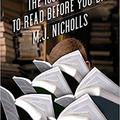Joanne Harris: Blueeyedboy
 I happen to be a sucker for stories dealing with questions of real and virtual identities and the connections between reality and fiction, so when I read that Blueeyedboy is about a man who posts morbid entries on his blog and the story revolves around the fact that it’s not possible to determine whether his blog entries are fictional or not, I immediately wanted to lay my hands on this book.
I happen to be a sucker for stories dealing with questions of real and virtual identities and the connections between reality and fiction, so when I read that Blueeyedboy is about a man who posts morbid entries on his blog and the story revolves around the fact that it’s not possible to determine whether his blog entries are fictional or not, I immediately wanted to lay my hands on this book.
The protagonist of the novel is man called BB who works as a cleaner in a hospital, still lives with his oppressive mother at the age of forty-two, and still tries to deal with the neglect and pain he suffered as a child because his brothers were both better loved by their mother. In reality, BB is a reserved and unobtrusive man, but in a social network site called badboysrock he builds himself another identity – that of a cynical, strong-willed and cruel man – and he publishes supposedly fictitious stories on his blog under the assumed name Blueeyedboy, in which the hero (probably his alterego) cunningly takes revenge on everybody who had previously wronged him. In the meantime, Blueeyedboy also watches and manipulates the other members of the social site. The other narrator of the novel is Albertine who also writes a blog – from her entries, we learn the other side of Blueeyedboy’s stories. However, just like in the case of Blueeyedboy, it’s not possible to determine whether Albertine’s entries are about real or fictitious events, either.
Blueeyedboy and Albertine know each other in reality as well, and they share a couple of old secrets which are slowly revealed during the course of the novel – but, again, it’s not at all certain that what is revealed is the reality – it may as well be yet another fictive story.
All this might sound a bit complicated but this complexity lends a lot of charm to the novel, and I deeply admire Joanne Harris for the way she keeps both the meandering story and her two troubled protagonists in hand. Besides, she manages to convey how the real and virtual identities of her main characters interact and overlap with each other, and she cleverly negotiates her way between the real and fictitious stories written by her admittedly unreliable narrators.
Besides the fact that the main story is even more tricky than that of Harris’s other tricky novel, Gentlemen and Players, Blueeyedboy can be a thought-provoking read for everyone who has any kind of online life. The main character, for instance, sees the possibilities arising from the overlapping of the real and the virtual world very clearly, and he knows that his virtual identity is on the one hand a fictive (and untrue) one – but on the other hand, the virtual Blueeyedboy is perhaps exactly the person he always wanted to become, so in a sense it’s more truthful and more real than reality. However, BB is not someone who is content with simply creating an ideal online persona for himself: he also enjoys manipulating and unsettling others and he loves leaving everyone in doubt as to what’s true and what’s untrue.
The cynicism and self-irony of BB is remarkable, and even though he is well aware of the fact that his puny little self – constantly forced to remain in the background in reality – needs all the support and feedback he can get from his virtual friends, he doesn’t hesitate for a second to use and abuse these friends or simply drop his acquaintance with them if the need arises. His thoughts on the subject of virtual friendships are noteworthy. For instance, he writes about the games constantly going around in his circle of friends on the badboysrock site, the games where people have to answer questions about the last time they cried or their favorite flowers. BB always lies in these questionnaires, but knows that probably all the others tell the truth, so this way he learns a lot of useful information about everyone else’s real life. I think BB sees the way these quizzes work very clearly, and he understands (and uses to his own purposes) the relation which exists between a lot of people’s real and virtual identity: even though many people would like to hide behind their avatars, at the same time they have a craving to reveal their real personality, and they hope that by divulging such trivia as their favorite beverage or the clothes they prefer to wear in bed, they manage to reveal their personality to such an extent that they remain safely hidden but that become infinitely charming and intriguing to everyone else at the same time. (Parallel to their obsessive self-revelation, these people of course have an equally obsessive desire to find out about and analyze other people’s real personalities. And I think BB is right in this question as well: it’s a stupid and highly presumptuous idea to believe that anyone’s personality can be assessed based on a couple of stupid quizzes or any number of – seemingly brutally honest – blog post.)
Besides the fact that BB is aware of other people’s obsessive self-expression, he also knows how to make others love and pity him. His virtual affair with a fat woman, Chryssie is the best example for this. The girl clings to BB’s (or rather: Blueeyedboy’s) every word, she would like to meet him in real life as well, and she keeps sending her virtual hugs and kisses without restraint whenever she feels that someone has hurt her poor little Blueeyedboy.
I’ve had some kind of online life for about thirteen years now. During this time, I had periods when I talked to a lot of people on chat, I had periods when I was heavily involved in online gaming, I had periods when I was mainly hanging back and only reading other people’s stuff, and now I write a blog, I’m a relatively active member of a social site for book-lovers, and now and then I also participate in a couple of games which go around in the blogger community. Now, based on these experiences, I think that Joanne Harris depicts one facet of online life remarkably well: the way a personality can appear in a virtual space and the fact that sometimes the borderline between reality and fiction, and a person’s real and virtual, assumed persona gets blurred.
Besides the exceedingly interesting and very cleverly managed main theme of the novel, Blueeyedboy features several other exciting elements as well. One of these is that the book features the same public school for boys, St Oswald’s which also appears in Gentlemen and Players. This was only my second novel by Harris, so I don’t know whether she often uses self-references, but anyway, I like games like this very much – I very much like writers who create a kind of private world in their oeuvre, and I like to revisit their private worlds in different novels and learn something new about it, perhaps from a slightly different angle.
By the way, Gentleman and Players and Blueeyedboy are also similar in the sense that they both feature highly unbalanced and mentally unstable protagonists, and that they both manage to fool the reader in a very delightful manner. At least Harris managed to fool me fine again, and even though I knew something was up, I couldn’t figure it out and I felt dumbfounded quite a few times while reading this novel.
The musical references in the novel are also worth mentioning. Blueeyedboy’s blog posts always feature a song – which either underscores the atmosphere of the entry, refers to its content, or comments on the story in an ironic fashion. And even though I wasn’t reading this novel with YouTube open in front of me all the time, after finishing the book, I checked out quite a few of the songs, and they indeed added something to effect of the novel. (The playlist for the novel is available here.)
The only weakness of the novel was the translation, but you probably won’t be reading this novel in Hungarian, so I won’t go into details here. I’m pretty sure this novel must be a delightful read in English.





